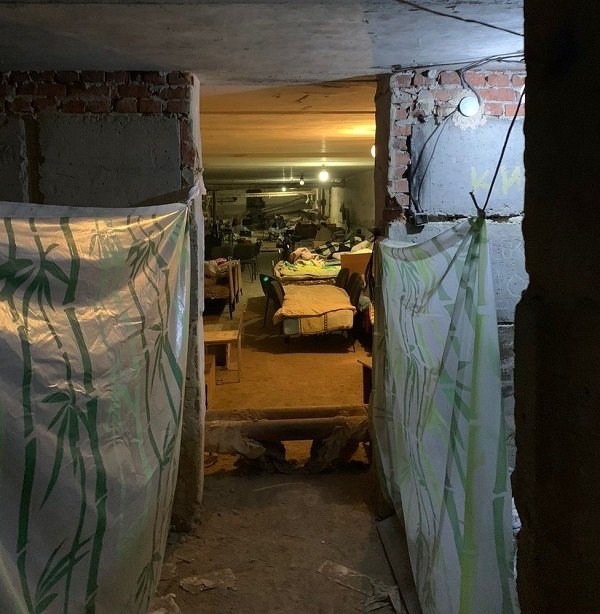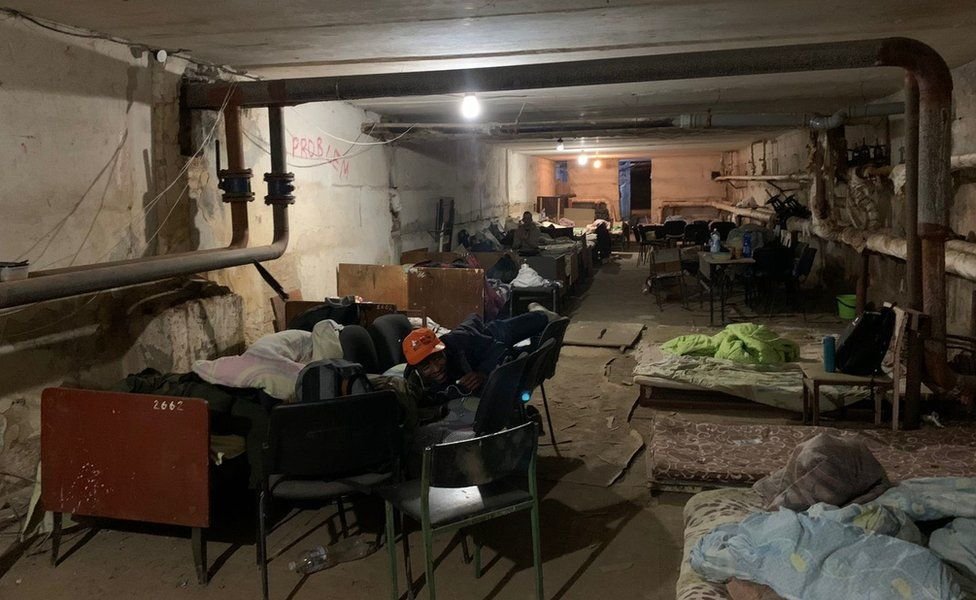Hot!
Ukraine: Trapped Nigerian on friendship and terror in Sumy

Nigerian veterinary student Samuel Otunla has been stuck in the north-east Ukrainian city of Sumy since the outbreak of the conflict. Ahead of reports that evacuations have begun, he sent the BBC an account of life in a city that is close to the Russian border and frontline.
The whole experience over the past 10 days has been nothing short of traumatic.
In cities further west, civilians have been able to leave and cross the border to safety in Poland, Romania, Hungary or Slovakia but we have been unable to leave Sumy.
The railway has been closed so there are no trains.
The main roads are largely inaccessible – some have been destroyed to stop Russian troops from advancing, while others have been totally blocked and taken over by the Russians.
Nevertheless, there are civilians who have made it out by road managing to negotiate their way through all the checkpoints. Others have tried and have either been shot at and forced to turn back or have reached dead ends where broken bridges have made it impossible to proceed.
Yes, it is possible to leave Sumy but it is extremely risky – and expensive.

Expensive because the Ukrainian drivers who are able to transport students are charging between $2,000 and $5,000 (£1,500 and £3,800) for a drive down south of 200km (124 miles).
After that anyone fleeing needs to catch a free train to a city in the west, like Lviv, and then cross the border.
So, in reality, we can’t get out.
Officials from Sumy National Agrarian University told us a couple days ago that there were discussions to set up a humanitarian corridor to allow civilians to leave Sumy and other areas safely.
On Monday, buses had been prepared so that students could be moved but unfortunately the Russians have not agreed to a ceasefire so the Ukrainian government cannot, for our own safety, transport us.
The Nigerian government has helped students get back home but, so far, only once they have managed to cross the western border, which is 1,300km away – so that doesn’t help us, at least not yet.
The Nigerian embassy in Russia (and other African countries I understand) has offered us the option of being taken to Russia and evacuated from there.
Many students have rejected this idea and rightly so. Russia is the enemy.
The best option is to get us to the west.
Meanwhile in Sumy, we are constantly getting safety warnings from the military. When the siren goes off everyone has to run down to the bomb shelters for safety.

Usually from down in the shelter, we hear the shelling and gunfire.
I, together with over 60 international students, Ukrainian students and hostel staff have spent the past seven nights in a dusty basement that doubles as a bomb shelter. It’s not a good experience.
We’ve received financial help from different organisations and through these we have been able to get groceries and other supplies.
We don’t know how much longer we will be here but we may need more supplies soon.
Source: BBC
Hot!
Speaker of Parliament inaugurates open Parliament Steering Committee, launches action plan

The Speaker of Parliament, Alban Sumana Kingsford Bagbin, has launched the Open Parliament Steering Committee and the Open Parliament Action Plan.
The ceremony was under the theme “Achieving Gender Equality: Action by Action.”
The Speaker highlighted the critical role Parliament plays in translating the will of the people into inclusive legislation, responsive policies, and accountable governance.
“The International Day of Parliamentarianism is worth celebrating, as it offers an opportunity not only to recognise and promote achievements in strengthening democratic governance, but also to pause and reflect on the remaining gaps in institutionalising parliamentary democracy,” he said.
He noted that the event was scheduled to coincide with the International Day of Parliamentarianism to reinforce the importance of open and inclusive governance.
The Majority Leader, Mahama Ayariga, stated that the International Day of Parliamentarianism is intended to recognise the vital role Parliaments play globally as pillars of democratic governance.
He noted that this marks the first time Ghana is formally observing the day.
“The gravity of our observance is further accentuated as we convene to witness the launch of the Open Parliament Action Plan by the Open Government Partnership Caucus,” he said.
Delivering a statement on behalf of the Minority Leader, Alexander Kwamena Afenyo-Markin, the Deputy Minority Leader, Patricia Appiagyei, described the Open Parliament Action Plan as a transformative initiative aimed at strengthening the relationship between Parliament and the public.
She said the plan represents a bold commitment to making Parliament more transparent, accessible, and responsive to the needs of Ghanaians.
The Clerk to Parliament, Mr. Ebenezer Ahumah Djietror, described the launch as a key milestone in the effort to build a citizen-focused and accountable Parliament.
He added that the International Day of Parliamentarianism is a call to action to recommit to the highest standards of public service and democratic accountability.
The inauguration was attended by a wide range of stakeholders, including the Majority and Minority Members of Parliament, members of the Open Parliament Steering Committee, the Open Government Partnership (OGP) Caucus, Parliamentary Network Africa, representatives from civil society organisations, members of the diplomatic corps, traditional and religious leaders, student bodies, the Parliamentary Press Corps, and other media partners.
Hot!
NACOC declares drug menace a national emergency

The Parliamentary Committee on Defence and Interior has paid a working visit to the Narcotics Control Commission (NACOC) to engage with its leadership and assess operational challenges hampering the fight against illicit drugs.
In a detailed presentation, Dr. Basha Ligbi, Head of the Commission’s Research Bureau, highlighted critical setbacks including broken body scanners at airport terminals, inadequate office infrastructure, overcrowded detention facilities, and deteriorating vehicles.
He also called for the Commission’s headquarters to be reclassified as a security zone, citing growing security risks due to private encroachment and nearby high-rise developments.
Director General of NACOC, Brigadier General Maxwell Obiba Mantey, described the escalating drug trade as a national emergency, warning that drug barons now rival armed robbers in threat level and are gaining influence at the highest levels.
He appealed for stronger institutional support and morale-boosting interventions to preserve the integrity of NACOC officers.
Chairman of the Committee and MP for Builsa North, James Agalga, assured the Commission of the Committee’s commitment to escalate the concerns to Parliament and engage key justice sector stakeholders to fast-track reforms in support of NACOC’s mandate.






